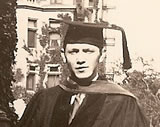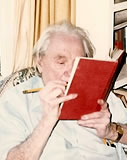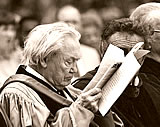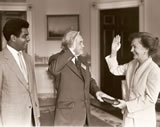A Biographical Sketch of Henry Steele Commager
by Richard B. Bernstein
Remembering Henry
Henry Steele Commager died March 2, 1998, he was 95. His obituary and selected contents of his Memorial Service are here.
Commager Chronology
Below is a listing of the major events in Henry Steele Commager's life.
- View Entire Chronology
- 1902 - Oct. 25 Born
- 1923 - Completes A.B.
- 1924 - Completes M.A.
- 1926 - Joins NYU Faculty
- 1928 - Completes Ph.D.
- 1936 - Theodore Parker
- 1939 - Joins Columbia Faculty
- 1942 - Pocket History of the U.S.
- 1954 - Freedom, Loyalty & Dissent
- 1956 - Joins Amherst Coll. Fac.
- 1965 - Nature & Study of History
- 1971 - Amer. Acad. Gold Medal
- 1984 - Claude Pepper Medal
- 1990 - Bruce Catton Award
- 1992 - Commager on Tocqueville
- 1998 - Mar. 2 Dies
Henry Steele Commager, youngest son of James W. Commager and Elisabeth Dann, was born on October, October 25, 1902 in Pittsburgh, Pennsylvania. Orphaned at an early age, he went to live--, first in Toledo, Ohio and later in Chicago--, with his maternal grandfather Adam Dan, a well known pastor of the Danish Lutheran Church. Upon graduation from high school, he went to work in the library of the University of Chicago. Working his way through his undergraduate years, Commager had earned the B.A., M.A., and Ph.D. degrees by the time he was 28. His first teaching position was at New York University where he began as an instructor in 1926. A decade later he joined the faculty of Columbia University (from 1936 to 1956) and later went on to Amherst College (from 1956 to 1992). In addition he held visiting professorships at many other universities both within the United States and abroad. His affiliation with Peterhouse, Cambridge lasted until his death on March 2, 1998.
Not only was Commager often cited as one of, if not probably the most, famous historian of his time; he also was a highly respected participant in public debate. Indeed, his fame was rooted at least as much in his engagement with great public issues over nearly six decades of lecturing and writing - from the era of Franklin D. Roosevelt's New Deal through the age of Ronald Reagan - as in his work as a historian or as a professor. Commager is notable precisely because he scorned gaps separating professional and general audiences and rejected the idea that a historian had to choose between cloistered pursuit of scholarship and vigorous, even polemical discourse in the public realm.

Henry S. Commager
Graduation 1923
At Chicago, Commager studied a wide range of historical subjects. He wrote his PH.D dissertation on the Danish philosopher and reformer Johann Struensee. The choice of Struensee was more a reflection of his Danish heritage through his mother's family than the result of formal study. While at Chicago the example and teaching of his mentor Andrew C. McLaughlin influenced him to concentrate his interests on American history. In 1930, while still a young professor at New York University, he became co-author, with Samuel Eliot Morison of Harvard University, of the widely-used history text THE GROWTH OF THE AMERICAN REPUBLIC (1930), a reworking of Morison's earlier OXFORD HISTORY OF THE UNITED STATES. The two scholars published further revised and expanded editions in 1937, 1942, 1950, 1962, and 1969; the seventh edition appeared in 1980, with William E. Leuchtenburg as a new co-author. Leuchtenburg, one of Commager's graduate students at Columbia, also prepared two abridged editions in 1980 and 1983 under the title CONCISE HISTORY OF THE AMERICAN REPUBLIC and is currently working on a new version scheduled for publication in 2008.
Commager's interest in aiding the task of classroom teaching of American history also contributed to his editing of the famed anthology DOCUMENTS OF AMERICAN HISTORY (1934), which reached its tenth edition (co-edited with his former student Milton Cantor), in 1988, more than half-a-century after its first appearance. THE DOCSUMENTS (as Commager referred to the book) long reigned as a standard reference-work. His two documentary histories, THE BLUE AND THE GRAY and THE SPIRIT OF SEVENTY-SIX (the latter co-edited with his longtime friend and Columbia colleague Richard B. Morris), treat the Civil War and the American Revolution, respectively, as seen by participants.

Henry Commager 1985
With Richard B. Morris, Commager also co edited the New American Nation Series (begun in 1954), a multi-volume collaborative history of the United States under whose aegis appeared many significant and prize-winning works of historical scholarship -- including David M. Potter (completed by Don E. Fehrenbacher), THE IMPENDING CRISIS, 1848-1861 (1976); Eric Foner, RECONSTRUCTION: AMERICA'S UNFINISHED REVOLUTION, 1863-1877 (1988); Richard B. Morris, THE FORGING OF THE UNION, 1781-1789 (1987); William E. Leuchtenburg, FRANKLIN D. ROOSEVELT AND THE NEW DEAL, 1932-1940 (1963); Arthur S. Link, WOODROW WILSON AND THE PROGRESSIVE ERA (1960); and Allen J. Matusow, THE UNRAVELING OF AMERICA: A HISTORY OF LIBERALISM IN THE 1960s (1984).
Commager's first book written alone was THEODORE PARKER: YANKEE CRUSADER, his 1936 biography of the Unitarian minister, Transcendentalist, reformer, and abolitionist; it was reissued in 1960, along with an edited volume collecting the best of Parker's voluminous writings. Commager's monograph THE AMERICAN MIND: AN INTERPRETATION OF AMERICAN CHARACTER AND THOUGHT SINCE THE 1880s (1950) was perhaps his best-known work of history; in many ways, it represented a continuation of the approach to American intellectual history associated with Vernon Parrington's MAIN CURRENTS IN AMERICAN THOUGHT, not least because it picked up where Parrington's untimely death interrupted his work. A companion to that book, focusing on an earlier period that dominated Commager's later intellectual and scholarly endeavors, is THE EMPIRE OF REASON: HOW EUROPE IMAGINED AND AMERICA REALIZED THE ENLIGHTENMENT (1977). As these books suggest, he was principally an intellectual and cultural historian, though he also worked in the fields of constitutional and political history, as shown by his controversial 1943 series of lectures, MAJORITY RULE AND MINORITY RIGHTS. In that study, he argued that the Supreme Court generally should defer to popularly-elected legislatures and chief executives in deciding the constitutionality of their actions; when the Warren Court moved vigorously in the direction of protecting individual rights and vindicating the ideal of constitutional equality, Commager championed their work in essays for popular and scholarly periodicals.

Graduation 1982
Reading Surreptitiously
Commager was an ardent defender of the Constitution and the Bill of Rights. He opposed McCarthyism in the 1940s and 1950s, the U.S. war in Vietnam (on constitutional, political, and philosophical grounds) in the 1960s and 1970s, and the rampant illegalities and unconstitutionalities perpetrated by the administration of President Richard M. Nixon (1969-1974). One favorite cause was his campaign to challenge the constitutionality of the Central Intelligence Agency, the budget of which, being classified, violates the requirement of Article I of the U.S. Constitution that no moneys can be spent by the federal government except those specifically appropriated by Congress. He continued his critique on constitutional and moral grounds of American defense and foreign policies during the administrations of Presidents Ronald Reagan and George H. W. Bush (1981-1993).
Though Commager often characterized himself as a Jeffersonian, we must understand his use of the term. Commager's Jefferson was an enlightened and far-seeing philosophical statesman, a tolerant man with a sweeping commitment to human freedom and a confident, philosophically-rooted pragmatism about politics and governance. His version of Jefferson, and thus his enlisting under Jefferson's banner, is best understood as a reflection of his formative period's version of Jefferson, strongly flavored as it was by Jefferson's leading advocate at that time, President Franklin D. Roosevelt. Commager's Jeffersonianism was refracted through his admiration for Roosevelt and the New Deal -- just as his friend and counterpart Arthur M. Schlesinger may have rendered in his classic THE AGE OF JACKSON a portrait of Andrew Jackson unnervingly reminiscent of Roosevelt. Commager was representative of his time in following Roosevelt's oft-quoted prescription of applying Hamiltonian means to Jeffersonian ends, and in regarding Jefferson and many of the other great figures of the Revolutionary generation almost as contemporaries and intellectual compatriots.
Commager achieved widespread fame as a historian through his prolific writing on history and politics for popular magazines and newspapers -- many of the best of them collected in his books FREEDOM, LOYALTY, DISSENT (1954); THE SEARCH FOR A USABLE PAST AND OTHER ESSAYS IN HISTORIOGRAPHY (1965); FREEDOM AND ORDER: A COMMENTARY ON THE AMERICAN POLITICAL SCENE (1966); THE COMMONWEALTH OF LEARNING {1968}; THE DEFEAT OF AMERICA: WAR, PRESIDENTIAL POWER AND THE NATIONAL CHARACTER (1975); and JEFFERSON, NATIONALISM, AND THE ENLIGHTENMENT (1976). He often was interviewed on television news programs and public-affairs documentaries to provide historical perspective on such diverse events as the Apollo XI moon landing and the Watergate crisis.

Swearing in Ceremony
Council on Education
Commager's status as a professional historian anchored his credibility as a participant in the public controversies into which he threw himself. Indeed, Commager would have insisted both that his work as a historian informed his engagement with contemporary political affairs, and that his engagement with the politics of his day inspired his most creative and effective explorations and interpretations of the American past. Commager saw these two roles not as divided realms but as points on a spectrum of activity. It is thus not surprising that Commager was most often drawn to two earlier generations of engaged intellectuals who also worked closely with history - the Progressives of the early twentieth century and the Revolutionary generation of Americans of the late eighteenth and early nineteenth centuries - nor that he also devoted careful and respectful study to two other nineteenth-century figures who were both scholars and engaged intellectuals, Justice Joseph Story and Alexis de Tocqueville.
Even so, Commager's primary professional identity - the way he saw and defined himself - was as a historian, and it was that sense of himself and of the historian's calling that he sought to communicate to generations of students, especially at both Columbia and Amherst, and to thousands or millions of readers of his books, articles, essays, lectures, documentary collections, "op-ed pieces," and letters to the editor. Indeed, he thought of, and often referred to, those activities as teaching by other means, and he saw no clear line separating his historical scholarship from his work as a public intellectual. Indeed, Commager insisted that historians must write not only for one another but for a wider audience - a conviction that he sought to instill in generations of his graduate and undergraduate students, and that he embodied in his own work. Commager's principal achievement -- embodying his ability to distill the history of the United States, in particular the confluence of ideas and politics, with skill and elegance -- is of continuing value despite, or perhaps because of, the clarity with which Commager's formal historical writings express his values and political preferences.
Commager was an inspiring lecturer -- learned, erudite, but never dull and always committed to making his thought and work accessible. He was a great teacher, devoted to his calling and concerned about his students as people. He once said about teaching, "What every college must do is hold up before the young the spectacle of greatness." He was talking about historical figures, but his dictum applies equally well to his own life and career.
